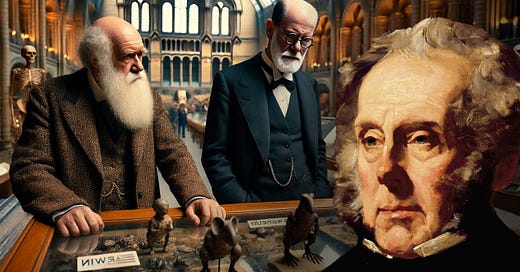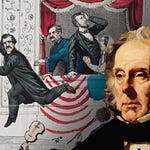Episode 03 - The Venetian Takeover of England: A 200-Year Project
Episode 05 - Bestial British Intelligence Of Shelburne and Bentham
Episode 07 - Palmerston Launches Young Turks to Permanently Control the Middle East
Episode 08 - Freud and the Frankfurt School
Episode 09 - Jim Crow, a Cultural Weapon in the Hands of the Confederacy
🧠 An In-depth Critique of Modern Cultural Theory
The synthesis of Freudian psychoanalysis with Marxist ideology, undertaken by the Frankfurt School in the early 20th century, has left an indelible mark on modern culture. This ideological merging has fostered a worldview skeptical of traditional values and inherently distrustful of optimism, embracing instead a cultural pessimism that upholds personal hedonism and the relativity of truth. By placing human irrationality and instinctual drives at the forefront of societal theory, the Frankfurt School sought to dismantle universal moral frameworks in favor of individualized identities. This piece explores how the Frankfurt School’s ideas reshaped cultural, social, and political landscapes, driving identity politics and reconfiguring American society in the wake of World War II.
📜 Freud’s Roots and Their Influence on Cultural Critique
Sigmund Freud’s foundational role in psychoanalysis rests on his investigations into human sexuality and unconscious drives. His influence was particularly potent in Vienna, where Freud’s theories were incubated among like-minded circles, eventually fostering the ideas that would permeate Western psychological and philosophical thought. Freud posited that sexual desire, present even from infancy, was the core of human motivation, thus upending traditional views on morality and rationality. His analysis of figures like Leonardo da Vinci, whom he controversially labeled an “ideal homosexual type,” demonstrates Freud’s view that even the loftiest human pursuits are underpinned by sexual urges and biological impulses. For Freud, any notion of grand ideals or universal truths served merely to disguise our own innate drives, especially the repressed sexual impulses he deemed pervasive in every individual.
This concept of inherent irrationality aligned with the burgeoning Darwinian view of life as a biologically driven struggle, devoid of divine purpose or moral aim. Darwin’s theories suggested that humanity was not the pinnacle of creation but rather the product of relentless natural selection, a process indifferent to human values or aspirations. Freud adopted this Darwinian lens, channeling it into a psychological framework that depicted individuals as largely powerless over their subconscious urges. Freud’s views challenged humanity’s belief in its capacity for rational, moral action, reinforcing instead a view of the mind as an arena of biological conflict, driven by primal impulses beyond the control of mere reason.
🛠️ The Frankfurt School’s Vision: Merging Freud with Marx
The Frankfurt School, formed in Germany and later transplanted to the United States, took Freud’s concepts and intertwined them with Marxist theory to forge a comprehensive cultural critique. The School’s founders, influenced by Freud’s understanding of irrational drives, saw an opportunity to disrupt the social norms that had long held sway over Western civilization. They adopted Freud’s pessimism toward human nature, arguing that rationality and morality were illusions masking underlying biological impulses. From this perspective, social structures—particularly the family—were mechanisms for instilling authority and suppressing individuality.
The Frankfurt theorists believed that creating a transformative social change required a new model of psychology, one that would reveal the structures of oppression embedded in societal institutions. Freudian psychoanalysis, with its emphasis on subconscious forces, served as an ideal tool for challenging the optimism of Enlightenment thinking and its assumptions about rationality and moral progress. The School’s scholars, including Max Horkheimer, Herbert Marcuse, and Erich Fromm, argued that these optimistic ideals overlooked humanity’s inherent irrationality, promoting unrealistic expectations of social harmony and individual self-determination.
The School’s aim was thus to dismantle universal truths and embrace a moral relativism that would undercut any ideology advocating for objective principles or collective identity. By rejecting objective truths, they argued, society could free itself from the oppressive structures that dictated social norms and limited personal freedom. The Frankfurt School’s synthesis of Marx and Freud provided a vehicle for fostering ideological critique that could unravel traditional authority and promote a vision of society as an assemblage of unique, conflicting identities, each shaped by cultural and historical forces.
🌐 Cultural Fragmentation and the Rise of Identity Politics
This radical relativism laid the groundwork for the emergence of identity politics, a phenomenon that would profoundly reshape American society in the mid-20th century and beyond. The Frankfurt School’s embrace of cultural relativism enabled the formulation of identities grounded in historical victimhood, encouraging individuals and groups to define themselves by their past suffering rather than their shared human qualities. This approach to identity rejected any notion of common purpose or universal truth, advocating instead for a fragmented society composed of groups united only by their grievances against historical oppressors.
Through identity politics, the School’s theories infiltrated various social movements, from the civil rights and feminist movements to multicultural education. For instance, in the 1960s, the Frankfurt School’s frameworks were instrumental in reframing African American identity around the legacy of slavery and historical injustice, just as the Jewish identity was redefined around the Holocaust in the post-war period. By recasting identity in terms of victimhood, these movements promoted a sense of self rooted in resistance rather than in shared human experience or collective progress.
In the realm of feminism, the School’s impact is evident in the framing of gender as a source of division and victimization. Women were encouraged to understand their identity through the lens of male oppression, fostering an adversarial dynamic that reinforced a pessimistic view of social relationships. The School’s influence extended to educational institutions, where multiculturalism became a framework for promoting diverse but distinct identities, each with its grievances and separate historical narratives. By emphasizing these differences over shared values, the Frankfurt School’s ideas cultivated a society increasingly focused on individual and group identities as opposed to a unified national or human identity.
🔍 The Lasting Legacy of Cultural Pessimism and Relativism
The Frankfurt School’s emphasis on pessimism and relativism has had lasting consequences, permeating Western culture and reshaping public consciousness. By asserting that all values are culturally specific and rejecting the existence of universal truths, the School laid the intellectual foundation for modern-day skepticism toward established social institutions. The family, once viewed as the bedrock of society, became a focal point for criticism, with theorists arguing that it perpetuates authoritarian values and suppresses individual autonomy. The School’s approach to family dynamics suggested that traditional roles were mechanisms of control, inhibiting the development of true personal freedom and self-expression.
This rejection of traditional structures extended to religion, morality, and other social institutions, which the Frankfurt theorists saw as vehicles for oppression rather than sources of meaning or cohesion. Their critique posited that true mental health and personal fulfillment could only be achieved by breaking free from these structures and embracing an individualized sense of identity. However, this vision of liberation, grounded in the acceptance of humanity’s irrationality, has arguably fostered a culture of cynicism, where any pursuit of collective good is viewed with suspicion and idealism is dismissed as naïve.
📌 Conclusion: A Fragmented Legacy
The Frankfurt School’s fusion of Freudian psychoanalysis with Marxist critique reshaped Western cultural thought, creating a society increasingly focused on individual identities and historical grievances rather than on shared human values. By promoting moral relativism and emphasizing humanity’s inherent irrationality, the School challenged traditional values and offered an alternative vision centered on cultural and ideological pluralism. This worldview has left a legacy of fragmentation, where identity politics and cultural skepticism often override collective aspirations. As modern society continues to grapple with issues of identity, culture, and social cohesion, the Frankfurt School’s impact remains profound, raising questions about whether its philosophical legacy has truly liberated the individual or simply fostered division and disillusionment in the search for meaning.
🕰️ Timeline in “Freud and the Frankfurt School”
Late 19th Century
1859: Charles Darwin publishes “On the Origin of Species”, introducing theories of natural selection and survival of the fittest. This perspective influences later Frankfurt School theorists to adopt a worldview that downplays morality in favor of biology and survival.
1860s-70s: Darwin’s ideas gain traction, inspiring philosophers and scientists to view human existence as biologically driven rather than morally directed. This era of scientific determinism significantly influences Freud and the later philosophical ideas of the Frankfurt School.
Turn of the 20th Century
1890s-early 1900s: Sigmund Freud develops psychoanalysis, focusing on the unconscious mind, sexuality, and human irrationality. Freud argues that fundamental human drives, including sexuality, start from infancy, challenging Victorian moral ideals.
1900s-1920s
Early 20th Century: Freud’s theories gain influence in Europe, especially in Vienna, where they intersect with other social and intellectual movements. Freud’s ideas become associated with revolutionary, anti-traditional thinking that seeks to dismantle societal norms.
1920s: Georg Lukács, a Marxist philosopher, develops the foundations of the Frankfurt School. He aims to synthesize Marxism and Freudian theory to foster cultural and social transformation through a revolutionary new psychology.
1930s
1930: The Institute for Social Research (Frankfurt School) is formally established in Frankfurt, Germany. Founding members include Max Horkheimer, Erich Fromm, and Herbert Marcuse, who combine Freudian psychoanalysis with Marxist thought to critique Western civilization.
1930s: The Frankfurt School theorists adopt Freud’s theories on human irrationality and sexuality, seeing these as tools to question and critique traditional Western values and structures, including the family and religious morals.
1940s-1950s
1940s: The Frankfurt School relocates to the United States during World War II. In the post-war period, their ideas begin to influence American culture, psychology, and sociology.
1945 onwards: The Frankfurt School’s synthesis of Freud and Marx becomes increasingly popular in the United States. They promote ideas of cultural relativism, individual hedonism, and identity politics, impacting post-war thought and academic disciplines.
1960s
1960s: Identity politics influenced by the Frankfurt School gain traction during the civil rights, feminist, and anti-war movements. African Americans, women, and other groups are encouraged to view their identities in terms of historical victimhood, inspired by Frankfurt School ideas on group identity and social grievances.
1960s-70s: The Frankfurt School influences multiculturalism and educational theory in the United States, promoting cultural identities based on distinct historical narratives. This fosters a society where diverse identities are emphasized over shared human values.
1970s-1980s
1970s-80s: Frankfurt School ideas on moral relativism and anti-authoritarianism permeate American academia and popular culture, leading to widespread acceptance of subjective truth and skepticism toward traditional institutions like the family and religion.
Late 20th Century to Present
Present Day: The Frankfurt School’s legacy is evident in identity politics, cultural fragmentation, and skepticism toward universal moral truths. Modern social and cultural debates continue to reflect the School’s influence on the nature of personal identity, moral relativism, and ideological pluralism.
Palmerston’s Zoo Series
For the past 30 years, media and academia have largely ignored the groundbreaking lectures presented at the President's Day 1994 Schiller Institute and International Caucus of Labor Committees conference. Yet, they contain some of the most vital historical insights for anyone seeking to understand the forces shaping today's world. "Palmerston's Zoo" is a deep exploration into the intricate workings of British imperialism—revealing the key figures, strategies, and philosophies behind its shadowy influence over global politics. This series brings together eight distinct but interwoven narratives that expose the power structures, manipulations, and covert operations that have determined the course of world history.
The Duke Report presents this podcast as an opportunity to breathe new life into these timeless analyses, giving listeners a comprehensive perspective connecting past imperial strategies and present-day geopolitics. The impact of these lectures is staggering, providing crucial context for understanding current events—a context that has never been widely disseminated through mainstream academic or media channels. The insights offered here are not just historical; they are the key to unlocking the deeper narrative of how global influence operates, making this possibly the most important history lesson for 21st-century humans. Join us on a journey that defies conventional narratives, challenges accepted truths and provides an essential map to navigate the complexities of modern power.
Links to authors and sources:
Let me know if anyone has been left out













Share this post